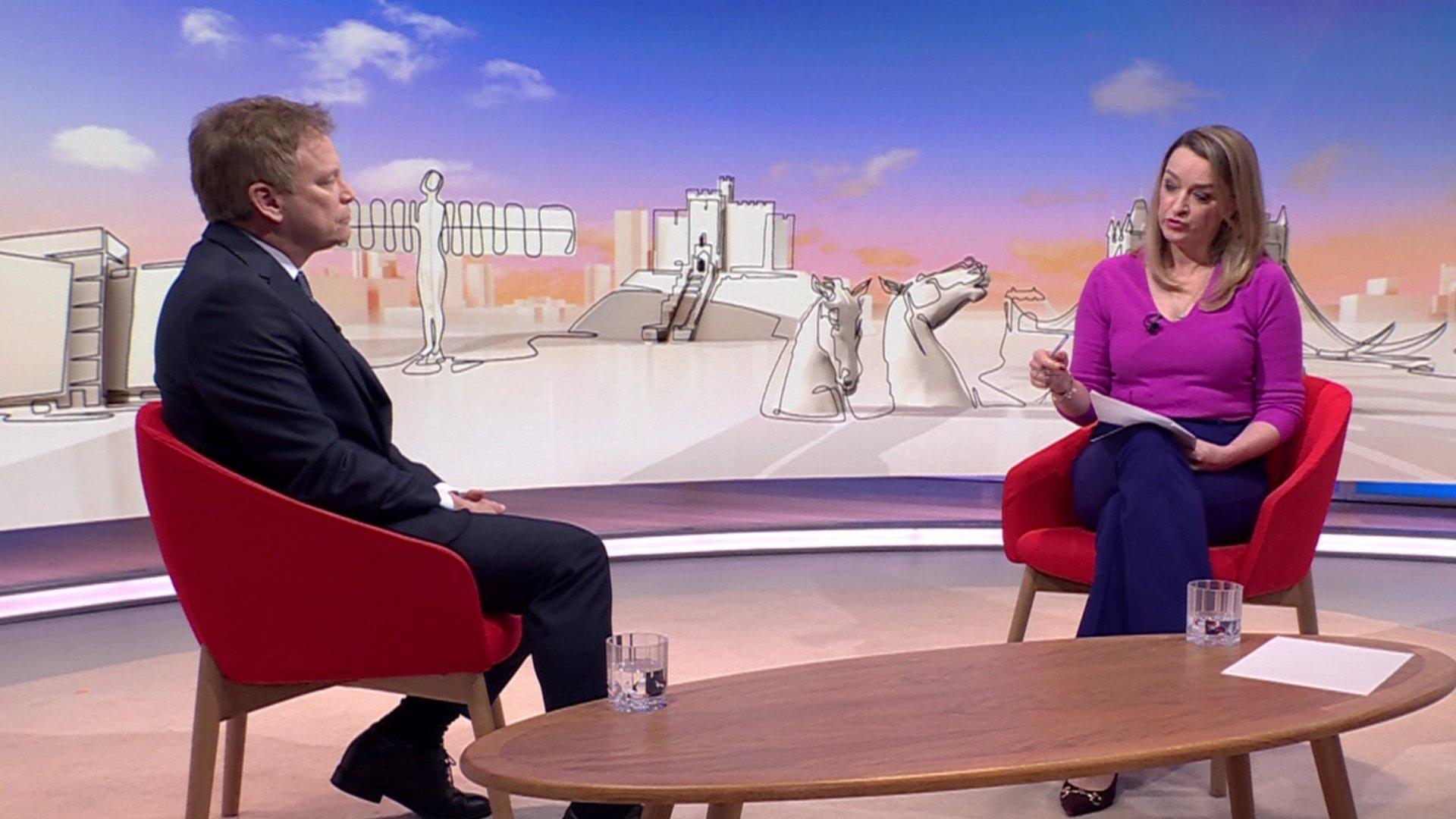Rishi Sunak's five pledges are difficult to deliver, Grant Shapps says
- Published
Grant Shapps: "I accept that they are very difficult and detailed pledges"
Prime Minister Rishi Sunak's five key pledges to voters are "difficult" but the government is committed to delivering them, Energy Secretary Grant Shapps has said.
In January, Mr Sunak vowed to halve inflation, grow the economy, reduce national debt, cut NHS waiting lists and stop migrant boats.
Mr Shapps on Sunday urged people to wait before judging the PM's promises.
But Labour said the government's policy agenda lacked ambition.
Mr Shapps appeared on the BBC's Sunday with Laura Kuenssberg programme after Mr Sunak was scolded by critics within his party over the weekend, with senior Conservative MPs venting their anger over heavy losses in May's local elections in England.
Mr Shapps downplayed reports of growing Tory unrest over Mr Sunak's leadership - and accepted the prime minister's five pledges were "difficult and very detailed".
"These are not vague numbers... It is difficult," he told the programme. "I thought it was always going to be difficult."
The energy secretary said the prime minister would not change course, insisting "we are still absolutely committed to delivering those things".
It was no surprise that Mr Shapps said Mr Sunak was still committed to the promises - but the admission that it would be difficult for him to stick to them was notable.
Progress on the now famous five pledges is not stellar.
Hospitals in England have failed to hit key targets to resolve backlogs in cancer care and routine treatment.
UK inflation remains close to its highest level for 40 years, and according to the Bank of England is not dropping as quickly as predicted.
Economic growth is measly, although recession has probably been avoided, and last week 564 people crossed the English Channel in small boats.
Mr Sunak's credibility is based on keeping those promises, which are far from straightforward.
In his interview, Mr Shapps called on people to "wait until the end" of Parliament to judge the PM's progress on his promises.
On growth, he said: "We have avoided the recession that even the experts were predicting.
"His pledge was to grow the economy, and we're starting to see it grow."
On other pledges, he said the government had put "huge resources" into cutting NHS waiting lists and was bringing in legislation that would help stop migrant boats crossing the Channel.
Appearing on the same programme Labour's shadow business secretary, Jonathan Reynolds, said his party had ambitious policies to meet the country's challenges.
"We don't see that from the government," he said. "I listen to government ministers, and all I hear is, we're going to do the same, more of what we've done for the last 13 years, and it hasn't worked."
Tory disquiet
It has been a tricky few days for the prime minister, with former cabinet ministers openly criticising the direction of policy under his leadership.
Speaking at a conference held by the Conservative Democratic Organisation (CDO) on Saturday, former Home Secretary Priti Patel blamed the party's leadership for the loss of more than 1,000 seats in the recent local elections.
Ms Patel said she was sorry that it was "errors and mistakes sometimes of us in Westminster and our actions that have cost our party dearly".
She was among several high-profile Tory MPs who spoke to the CDO, a new grassroots group of pro-Boris Johnson Conservatives.
Mr Shapps said his party was "buzzing with ideas" and that support for Mr Johnson among Conservatives was not a "shocking revelation".
"I don't have to agree with everything that everybody says to welcome the very fundamental fact that we're still the party coming up with new ideas, with a vision for the United Kingdom, and I think that is a good thing," he said.
Conferences and get-togethers by supporters of Mr Johnson are the most obvious signs of the rumblings of discontent, but they are not the only ones.
Earlier this week, Brexit-backing MPs were angered by a decision to revoke around 600 retained EU laws rather than the 4,000 pledged.
The government had originally promised a "sunset" clause on all EU laws carried over by the end of 2023.
But Business Secretary Kemi Badenoch said the cut-off point would be replaced with a list of 600 laws the government wants to replace by the end of the year.
Tory Brexiteer Jacob Rees-Mogg, who introduced the bill when he was in government, called the move an "admission of administrative failure".
The Tory fury continued this weekend, as Eurosceptic Conservative MP Sir William Cash called on the government to change course.
Defending his handling of Brexit in an interview with the Mail On Sunday, Mr Sunak said: "I voted for Brexit, I campaigned for Brexit, I believe in Brexit, and when I was chancellor I started to deliver some benefits of Brexit."
Related topics
- Published14 May 2023
